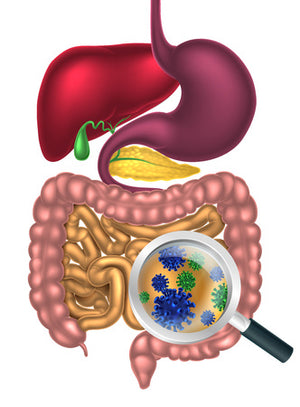How does the Bacteria in Your Gut Help You Digest Your Food?
September 07, 2017

You may already know that bacteria living in your gut can improve your health. Harvard University says that the trillions of bacteria living in your digestive tract can influence health and even improve a number of health conditions.
You may not know, though that the bacteria in your gut can actually help you digest your food and get more out of the food you eat.
About the Bacteria Living in Your Gut
The human gut contains tens of trillions of bacteria. In fact, there are ten times more microbial cells than human cells on and in your body. The microbes in your gut are quite diverse. There are more than 1,000 different species of bacteria living in your gut alone, although only 150 to 170 species have significant populations there.
Some of these species are harmful pathogens that can cause illness. Other bacteria are helpful and provide a variety of health benefits. Bacteria living in the gut play an important role in digestion, such as helping your body break down food and absorb nutrients.
Feeding Your Gut Bacteria Helps Improve Your Digestion
When you eat, you are also feeding the bacteria living in your gut. Just like you, these bacteria love to feast on carbohydrates, milk sugars and proteins. Both you and the microbes living in your gut benefit from this symbiotic dining relationship.
Carbohydrates arace important energy-providing nutrients for you and your gut microbes. Your body breaks down carbohydrates into glucose, a form of sugar that your body and the microbes within it use as fuel. Scientists categorize carbohydrates as either simple or complex, where a simple carbohydrate is fast and easy to digest and a complex carbohydrate takes more time.
Like other mammals, your body is well equipped to absorb simple sugars, known as monosaccharides, in the first segments of your digestive tract. Your small intestine can easily break down the sugars in milk, table sugar, and breads, for example.
Your body has a much more difficult time digesting complex carbohydrates, known as polysaccharides, such as the fiber and starch in grains, potatoes and legumes. Your small intestine has some luck breaking starches down but quite a bit of the fiber and other nutrient-rich polysaccharides pass into the lower portions of your digestive tract undigested.
Fortunately, the microbes living in your gut also get their energy from carbohydrates. The microbes living in the large intestine break down complex carbohydrates to release the nutrition in forms your body can absorb.
The microbes in your gut also help your body break down the sugars in milk. Lactose is a type of sugar found in dairy products. Cells linking the small intestine produce lactase, a type of enzyme that breaks down lactose into simpler molecules called glucose and galactose. People with lactose intolerance do not produce lactase, which means they cannot digest dairy products and experience symptoms such as diarrhea, nausea, abdominal pain and flatulence after eating milk, cheese, or other foods containing lactose (you can also learn about symptoms of an unhealthy gut here).
Fortunately, certain types of bacteria can break down lactose. Two strains of beneficial bacteria living in the gut, Lactobacillus acidophilus and Lactobacillus bulgaricus, produce lactase. These strains are also available in Natren’s probiotic supplements.
Bacteria in the Lactobacillales order, also known as lactic acid bacteria, can also improve the digestibility of milk products. Specifically, these bacteria may improve the digestibility of the protein casein, found in all types of mammals’ milk. For some people, consuming casein can cause bloating, pain, gas, diarrhea or gastroesophageal reflux. Yogurt and fermented cheese contain lactic acid bacteria that help improve digestion of casein.
The bacteria in your gut can help your body digest other types of proteins. Some bacteria are proteolytic, which means they break down proteins into molecules your digestive tract can absorb. The bacteria Lactobacillus bulgaricus (L. bulgaricus) breaks down the protein in yogurt, for example, to make the protein from cultured yogurt twice as digestible as regular milk protein. In other words, the bacteria in yogurt can potentially double the amount of milk protein available for absorption by your body.
L. bulgaricus may also help produce small peptides and free-form amino acids that are readily absorbed into your body. The production of free-form amino acids also helps your body absorb minerals. Natren is probably the only probiotic manufacturer that sells a pure probiotic strain of L. bulgaricus available in powders, capsules and chewable wafers.
You can optimize digestion of your next meal by supporting the population of beneficial bacteria living in your gut. Probiotic supplements contain the beneficial bacteria you need to keep your digestive tract in top running order.
The post How does the Bacteria in Your Gut Help You Digest Your Food? appeared first on Natren Probiotics Blog.





Leave a comment